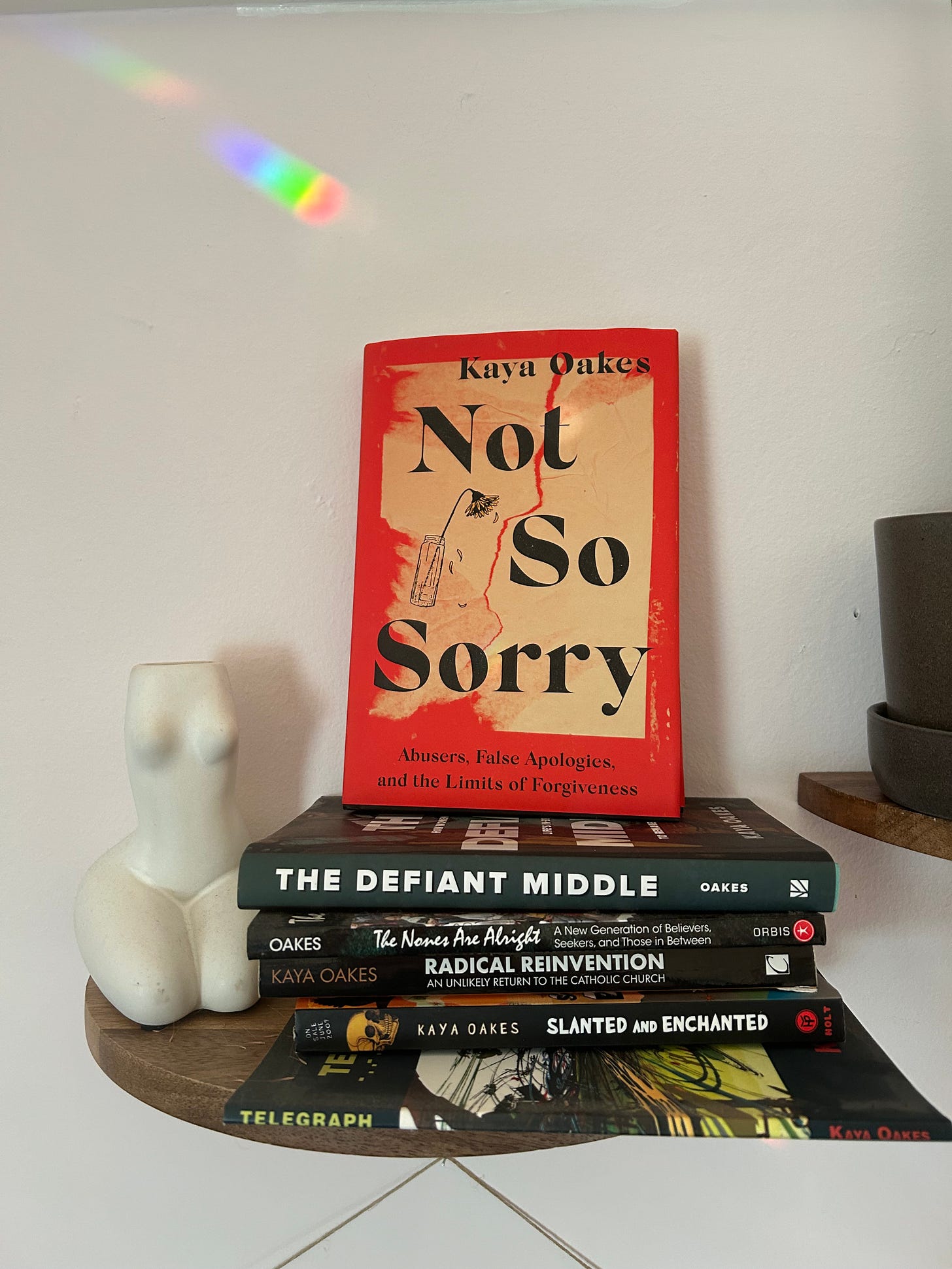Not So Sorry officially releases on July 30, but within the last 48 hours two people I love have shown me copies that Jeff Bezos apparently decided to send out early. Preorders help authors, writing reviews online helps authors, and asking your local bookstore/library to carry a book helps authors. But books are expensive, and sometimes as much as you might want to read one, you just can’t afford to shell out for a hardcover.
I’m a big believer in mutual aid, so here’s the deal: I’m giving away five copies of Not So Sorry from the author copies I got from my publisher in exchange for… whatever you can do. Write a review, post about it on social media, mention it to a friend, give it to a friend, put it in a Little Free Library (preferably in a middle to low income neighborhood if possible), put it on your syllabus, suggest it to your book club, hand it to a stranger, leave it on a train. You are under no obligation whatsoever to actually do any of these things, nor do you need to tell me what you did or didn’t do with the book. You don’t even have to read it. Just consider this my appreciation for your signing up for this newsletter.
EDITED TO ADD: This giveaway runs through the publication date, July 30.
Here’s how this will work: normally I don’t turn on comments here but they are on for this post. Just add your email or the email of a friend who you think might like the book (or a hater who might write something controversial about it because hey, all publicity is something or other), and I’ll assign each email a number and use a random number generator to choose the winner. If we don’t get five entries, I will donate any leftover copies to the Prisoners Literature Project (and I was planning to donate a few copies to them anyway).
Here’s the informative publisher blurb from the cover:
It's time for a nuanced discussion about forgiveness.
From religious communities to therapeutic spaces, the importance of forgiving those who've wronged us is often enshrined as an unqualified good. But what about horrifying cases of abuse, predatory behavior, or systemic wrong? Too often, when predators or abusers are exposed, the chorus comes immediately: "What about forgiveness?" In these cases, forgiveness places the onus on victims, diminishes real hurt and anger, lets perpetrators off the hook, and prevents justice from being done.
In Not So Sorry, journalist and culture critic Kaya Oakes tackles these questions with intelligence, nuance, and a bit of righteous anger. Ranging effortlessly from Christian theology and world history to psychology and pop culture, Oakes takes us on a whirlwind tour of the many abuses of the concept of forgiveness, including the abuse scandals of the Catholic church, the outing of high-profile abusers like Larry Nassar, and white America's obsession with false narratives of marginalized peoples granting forgiveness to oppressors. Ultimately, Oakes dares us to ask the necessary question: Is it ever better not to forgive?
And some endorsements.
"Kaya Oakes challenges those slippery, PR-constructed apologies that leave us rolling our eyes. But she does more than that. Throughout Not So Sorry, Kaya Oakes listens to the voices of victims, allows us to wrestle with our assumptions, and leads us on a path to restore justice." --Rev. Carol Howard, author of Healing Spiritual Wounds: Reconnecting with a Loving God after Experiencing a Hurtful Church, and pastor of Bedford Presbyterian Church
"In Not So Sorry, Kaya Oakes presents a thoughtful meditation on one of Jesus's most challenging commandments: that we forgive those who have wronged us. With compassion, curiosity, and conviction, Oakes invites us to consider the implications of forgiveness in a fraught age." --Michael J. O'Loughlin, author of Hidden Mercy: AIDS, Catholics, and the Untold Stories of Compassion in the Face of Fear
"Kaya Oakes has long been one of my favorite writers on the religion beat, but I can testify that no work of hers has challenged me like Not So Sorry. When you believe, as I do, that the genius of Christianity is its offer of mercy to even the worst of sinners, it is bracing, and difficult, to be reminded of the limits of forgiveness and the perils of cheap grace. In an age when abuse has been exposed as rampant, and accountability is so rare, Oakes's call to rethink forgiveness by centering survivors and reminding us of all the ways the powerful use and abuse the language of faith is essential reading." --Matthew Sitman, host of the Know Your Enemy podcast
Cheers and thanks for reading!




I already have my copy (thanks Jeff Bezos, I guess), but I would love another one to give to a friend.
lyoung@iccmail.org
I absolutely plan to read this. dehrenkrantz@gmail.com Thanks!!